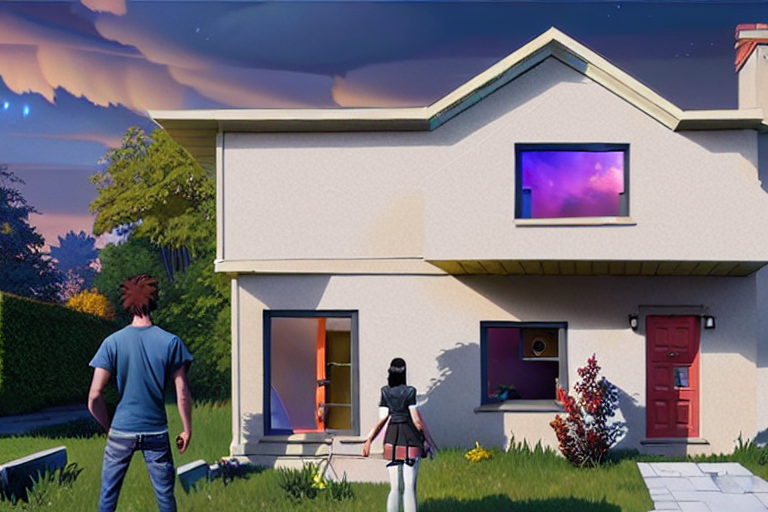For centuries, real estate has been one of the best ways to invest and grow capital. A witness of its past is a transaction dating all the way back to the Second Century, literally set in stone. In the 1900s, real estate started being what we know it to be now. In modern times, you buy a house in your city, rent it, and perceive a monthly revenue. And if you have several properties, you can earn a living from the rental income. But not only can you rent houses, flats, or land in the real world. With new ways of interaction and communication on the internet, it is also possible in virtual reality. A reality that anyone can access through VR glasses.

Had I told you to invest in digital real estate a decade ago, you would have said, “That’s bonkers.”
Today is a different story. Digital real estate is turning popular and seems to be quite lucrative. With the expansion of the metaverse, investors are paying attention since it’s a new form of investment to diversify their portfolio. Let’s take Decentraland for example, where you can play and meet hundreds of people’s avatars, as well as buy and rent virtual land for virtual events. This article will give you the nitty gritty of Digital Real Estate, and as expected, its pros and cons. But first, we need to know about the metaverse.
Today’s Focus of Attention is reader-supported. We sometimes include products we think are useful for our readers. If you buy through links on this page, we may earn a small commission.
What is the Metaverse?


The metaverse is an alternative world, a digital one that combines virtual and augmented reality. There, users create an avatar, interact with others, play, work, and live – digitally, of course.
As a concept, it’s been around for decades, but it became popular in October 2021, when Facebook, now Meta, announced it would become a metaverse company. Since then, the metaverse has gained popularity and made headlines in the media.
We can say this virgin land offers fresh opportunities, just like when Columbus set sail to America and opened the door for the European expansion and exploitation of the resources in the new continent.
What is Digital Real Estate?


Digital real estate is a subgroup of what is known as digital assets. At the same time, a digital asset is anything that has value and exists online, including domain names, social media accounts, famous websites, or apps.
For instance, if you register an easy-to-remember popular domain name focused on a specific target, such a URL is considered a “blue chip” and has a price. Other examples are sites or social media apps since they have tonnes of data attached to billions of users; that information is super valuable as it’s connected to different businesses. Nevertheless, digital assets are not limited to only online addresses, social media accounts, or apps.
With the surge of the metaverse, you could own digital plots of land in the virtual world and transform them into sources of income.
Let’s say AC/DC wants to host a concert in the cyberspace. For that, the band needs a venue to play. If you own land in the metaverse and you build a digital arena, you can rent your place for the event, and those attending have to pay for their ticket if they want to enjoy the show. To attend, AC/DC fans just need a pair of VR glasses and an avatar. Another example is to make a virtual house and let it serve as an art gallery for artists to showcase their creations. Endless possibilities.
How Does Digital Real Estate Work?
The first thing is to buy a non-fungible token (NFT) attached to a virtual plot of digital land. NFTs are cryptographic tokens that represent a unique product – an e-certificate of ownership.
Thus far, NFTs have been used for selling works of art or other collectible things, but for some time now they have been assigned to plots of land in the metaverse. When you purchase land in the real world, you receive a legal document called a title, which is a proof of your property of that area. Something similar happens in the cyberspace. After you buy a real estate NFT, you get a digital code, which is on the blockchain, and proves that you are the owner of the NFT. As the holder of such virtual real estate, you can build, rent, or sell if its value increases. You hold the reins.

Where to Invest in Digital Real Estate?


That is an issue. Look. There is no single metaverse; no official website. Lots of companies are working on their own metaverses, meaning you have to visit various sites and see all the possibilities these metaverses offer.
But it’s not too different from physical real estate. For instance, if you have some money and want to invest in a few properties, you must consider specific projects and neighbourhoods in many cities. One can be more expensive than the other, or maybe one is more suitable for a certain economic class, or another one is better for a farm than for a residential area. You’ve got to visit countless places and explore all the options online.
Similarly with social media. If you need to expand your business and want to advertise, well, you have to research which one suits you best. Facebook, Twitter, TikTok, or Instagram all have their own rules, targets, and functionalities. The same holds true with digital real estate. You’ve got to explore all the options online.
Bear in mind that a plethora of companies are emerging, and they are creating their own metaverses and building their own neighbourhoods, so you must analyse those alternatives. But if you ask me, which one is the most famous? I would say Decentraland is definitely the most popular. So far.
Pros of Digital Real Estate

We are surfing a new wave of the internet with the rise of cryptocurrency, NFTs, and blockchain. The internet is no longer a place to only get information from or read the news, watch videos, and chat. Now anyone can put on a VR headset, see their friends’ avatars, hang out, walk, attend a concert. All from their homes.
An amazing new experience the metaverse is.
One advantage is that since digital real estate is in its babyhood, anybody is able to buy a piece of cyber land for pennies on the dollar. Obviously, if we compare it to real land. However, digital real estate has its drawbacks.
Downsides of Digital Real Estate
As with any investment, you could lose your money. The potential benefits are irrefutable, but so are the risks involved.
Let’s picture this situation. You buy some land in one metaverse for £10,000, but in five years, people decide not to connect there anymore, for whatever reason, and go to another metaverse. Or the company responsible for that metaverse declares bankruptcy, or nobody rents your e-property. Or, in the worst-case scenario, the metaverse never takes off or gains traction with consumers and goes extinct. Recently, the portal The Street published an article titled “Mark Zuckerberg quietly buries the Metaverse.” The post states that the metaverse was a fling, but now is over, dead, and that this project recorded billions of dollars in loss.

What is the new focus? Artificial Intelligence (AI). In a 27 Feb Facebook post, Zuckerberg said that they are creating a new top-level group at Meta focused on generative AI to turbocharge their work in that area. Many things can happen.
Digital Real Estate is in a lawless land with few rules and authorities. There are no established guidelines for this matter to help you decide what to do, as happens with the stock market. To buy stocks, you find a myriad of sites, books, courses, and videos sharing insights on how to do it. Of course, the stock exchange has been operating for years. But with Digital Real Estate, nobody knows for sure what will happen. Perhaps it’s already dead and we’re still taking about it. From my perspective, I would not invest money that I’m not comfortable losing.


